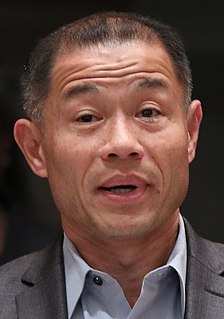A Quote by John Liu
I try to motivate people and align our individual incentives with organizational incentives. And then let people do their best.
Quote Topics
Related Quotes
There is a sense in which, like, it could be the case that the incentives of running for president and the incentives of getting maximum attention for yourself, sometimes align, and at a certain point, they stop aligning, and you just keep going with the incentives for maximum attention for yourself.
Many companies believe incentives, financial incentives, are the answer to every problem or issue. But people are motivated by much more than money. In particular, people like to feel good about themselves and maintain their self-esteem. If companies spent more time working on people's feelings of self-worth, they wouldn't have to try, often unsuccessfully, to bribe people to do work.
If you go back to Adam Smith, you find the idea that markets and market forces operate as an invisible hand. This is the traditional laissez-faire market idea. But today, when economics is increasingly defined as the science of incentive, it becomes clear that the use of incentives involves quite active intervention, either by an economist or a policy maker, in using financial inducements to motivate behavior. In fact, so much though that we now almost take for granted that incentives are central to the subject of economics.
A paycheck is a sufficient impetus to motivate some employees to do the minimum amount to get by, and for others, the challenge of getting ahead in the organization provides a satisfactory focus for a while. But these incentives alone are rarely strong enough to inspire workers to give their best to their work. For this a vision is needed, an overarching goal that gives meaning to the job, so that an individual can forget himself in the task and experience flow without doubts or regrets. The most important component of such a vision is an ingredient we call soul.
Although traditional incentives such as bonuses or recognition can prod people to better performance, no external motivators can get people to perform at their absolute best. . . .Wherever people gravitate within their work roles, indicates where their real pleasure lies—and that pleasure is itself motivating.


































